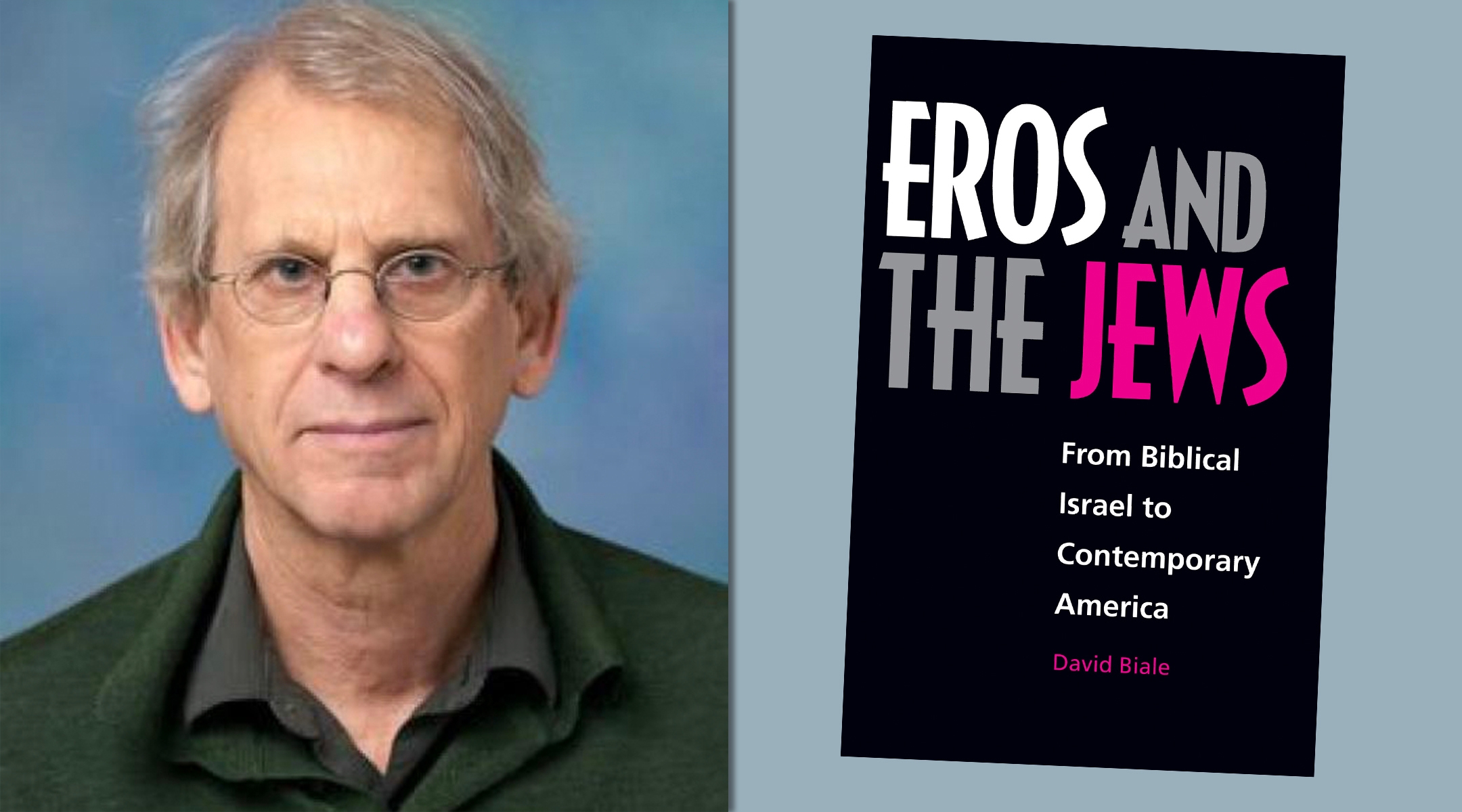David Biale, scholar of Jewish thinkers and ideas on the margins, dies at 75
One of his best-known books was a history of Jewish attitudes about sexuality

In books like “Eros and the Jews,” David Biale sought out areas of Jewish history often overlooked by other historians. (UC Davis; University of California Press)
(JTA) — David Biale, a professor of Jewish history who wrote award-winning books about heretics, free-thinkers, radicals and the marginalized in a method he called “counterhistory,” died Sunday of cancer. He was 75.
The author and editor of nine books, Biale was considered a trailblazer in the fields of Jewish studies and Jewish history, challenging existing assumptions about who should and shouldn’t be included in the academic canon. Drawing on the methods of the 20th-century historian Gershom Scholem — the subject of his doctoral thesis at Hebrew University in Jerusalem — he described counterhistory as “the discovery of vital forces precisely in what others have considered marginal, disreputable, and irrational.”
Biale once said he was inspired to write a book when someone commented that it was a “bad topic.”
The result of such contrarianism were important books on the themes as diverse as power, sexuality, secularization, blood and mysticism in Jewish history and culture. They include “Gershom Scholem: Kabbalah and Counter-History” (1979), “Power and Powerlessness in Jewish History” (1986) and “Cultures of the Jews: A New History” (2002), all three of which won the National Jewish Book Award.
In “Eros and the Jews: From Biblical Israel to Contemporary America” (1992), Biale explored the diverse and often contradictory messages about sexuality conveyed in Jewish culture, from the Book of Ruth and Yiddish literature to the memoirs of founding Zionists and the films of Woody Allen. A reviewer predicted it would become “a standard reference” on the topic, which it did.
“Rigorous in method, delicate in touch, Biale sheds light on corners of history that others deemed marginal or taboo, inviting us to engage in an exploration of ‘counterhistory’ that remains directly at the field’s heart,” Sarah Abrevaya Stein, a Jewish studies professor at UCLA, wrote in a blurb for Biale’s 2023 collection, “Jewish Culture Between Canon and Heresy.”
Biale was the Emanuel Ringelblum Distinguished Professor of Jewish History at the University of California, Davis, whose history department he joined in 1999. An alumnus of UC Berkeley and UCLA, he was previously the Koret Professor of Jewish History and director of the Center for Jewish Studies at Graduate Theological Union in Berkeley, California.
In addition to his academic work, Bible was a self-described Jewish activist who wrote op-eds and signed petitions from a liberal Zionist perspective. In an essay from March 2023, he lamented that Israel’s ruling Likud party had drifted “toward a kind of authoritarianism.”
Biale was born July 25, 1949, in Los Angeles, the son of Jacob Bialoglowski, an immigrant from Poland who became a professor of agriculture at UCLA, and Evelyn Karol, a daughter of Ukrainian Jewish immigrants who came to the United States before World War I. The family spent a year in Israel when Biale was 9 and his father was an agricultural consultant to the young state. Upon returning to California, Biale was active in a Labor Zionist group co-founded by his father.
In his teens he attended the Brandeis Alonim Summer Camp (now known as the Brandeis-Bardin Institute), a training ground for future Jewish scholars and activists.
After attending Harvard University for a year, he returned to California to be part of the counterculture and intellectual ferment at UC Berkeley, a center for student anti-Vietnam War protests and the Free Speech movement. There he helped found the Radical Jewish Union and published the “Jewish Radical,” a Jewish student newspaper whose contributors, he once wrote, included “so-called New Left people who believe that you can be leftists and also pro-Israel.”
In the summers he volunteered at a kibbutz in Israel and joined demonstrators who opposed Israel’s burgeoning occupation of the West Bank following the Six-Day War. He also met his future wife, Rachel Korati, now a clinical social worker and author of adult and children’s books. The pair were also collaborators: In 2021 they co-wrote “Aerograms Across the Ocean,” a collection of the correspondence they shared during this period, and they also worked together to resurrect a cherished Jewish learning initiative in the Bay Area after it folded.
Biale’s UCLA dissertation on Scholem became the first book-length study of the historian and thinker. Pleased by the attention, Scholem, then 80, told an interviewer on Israeli television, “You see, in California, they are writing about me.”
At a conference this spring at the GTU Center for Jewish Studies, Biale, who had been diagnosed with cancer, shared his reflections on mortality.
“To be alive is to be constantly in communion with the dead, with those who have been alive but are no longer,” Biale told the audience. “I cry for those I will leave behind, especially friends and family, and how all those generations that have gone before beckon me to join them. Death forces us to see ourselves for what we are, tiny specks in a vast universe, living infinitesimally short lives in astronomical time.”
Biale is survived by Rachel Biale, his son Noam, daughter Tali and several grandchildren.
A message from our Publisher & CEO Rachel Fishman Feddersen

I hope you appreciated this article. Before you go, I’d like to ask you to please support the Forward’s award-winning, nonprofit journalism so that we can be prepared for whatever news 2025 brings.
At a time when other newsrooms are closing or cutting back, the Forward has removed its paywall and invested additional resources to report on the ground from Israel and around the U.S. on the impact of the war, rising antisemitism and polarized discourse.
Readers like you make it all possible. Support our work by becoming a Forward Member and connect with our journalism and your community.
— Rachel Fishman Feddersen, Publisher and CEO



























